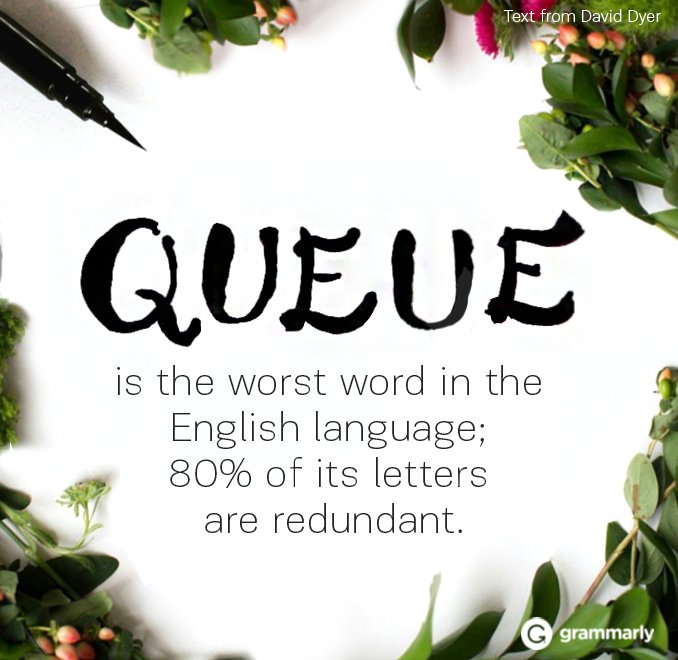— Grammarly (@Grammarly) November 24, 2015
Have you considered this, oh Grammarly.com*? Have you thought about the implications of yout statement? Are 80% of the letters of the word "Queue" really redundant?
English is a really strange language, who was first the bastard child of low-German, Saxon, Norman and then a vagabond thief, who stole words as her nation stole countries through the cunning use of flags.
The seventeen letter of the alphabet probably came to us from the Semitic Qoph, before being hammered into shape through the ages into the Phoenician Qōp and then maybe the Greek Qoppa (Ϙ). Modern Q probably showed up in Roman, with C, K and Q being used to represent "k" and "g" sounds.
In modern English, Q is usually followed by U because the Etruscan civilization who were eventually conquered by the Romans in 264BC, rendered "kw" sounds as "QV". The letter U came to us in the middle ages as a means to differentiate V and U sounds.
All this is mostly an aside though, because although it helps to explain why Qu is almost always seen in "native" words as a digraph, it doesn't really bring us a whole lot closer to assessing the claim by Grammarly.com.
Q
If 80% of the letters of the word "Queue" are really redundant, then Q is a legitimate word. Is that true though?
The only other one letter words in the English language are "A" which is a singular indefinite article (this is "a" blog post) and the word "I" which is the perpendicular pronoun. I hope that makes sense.
If Q is a legitimate word, then it would be unique in being the only one consonant word but without a vowel modifier, it's almost unpronounceable.
Q might very well the name of James Bond's gadgeteer quartermaster or someone in the Star Trek universe who has the power to alter time, space, and reality, but even then as a single letter, it's still pronounced something like "kyoo".
Clearly one letter is not enough.
Qu
Two letters? Is that "kwu" or "kwe"?
English is already idiotic enough with its spelling to suggest that anyone might hope to know that Qu is a word. The combination "ough" is already bad enough and has anywhere between six and ten different pronunciations depending on where you are in the Anglophone world.
I take it you already know, Of tough and bough and cough and dough?
Two letters isn't enough to carry a word like this along; not with so much ambiguity in the language.
Que
Is three letters enough?
Que?
Manuel, the very cheap waiter from Barcelona in the TV comedy Fawlty Towers is famous for the uttering of this three letter word. In his own words: "I can speak English, I learn it from a book."
I know that languages are different and that the same spelling might be pronounced differently both between languages and even in the same language (like that bottle of Polish polish you use to clean furniture) but Que is recognisable enough in English that it can only be pronounced "ke"
Three letters is not enough either.
Queu
Maybe this is the point where we should stop. "Queu" sort of looks like a legitimate word. Spelling is mostly arbitrary anyway; so there's no logical reason not to stop here.
Four letters might be enough.
Queue
As usual we can blame the English language for being a thief. The word "queue" was stolen from French in about the fifteen century and probably derived from the older word "Cue" which means a "tail"; which itself came from the Roman word "cauda" and Italian "coda". We still find Codas at the end of bits of music; which is the tail to a piece.
When we steal a word in English and especially when we steal one that's already in Roman script, we tend not to muck with it a lot unless your name happens to be Noah Webster.
Rather than being redundant, although the word looks idiotic, it's sufficiently interesting enough to be memorable and since people tend to read whole words at a go, rather than sounding out all the various parts, the word serves us well because it isn't ambiguous or easily confused with something else.
The other thing to bear in mind is that the silent-e on the end, is consistent with words like "cube", and even makes it look like it rhymes with words like "blue" and "true".
Five letters might be over-engineered but it works.
I think that an argument can be made that maybe 20% of the letters of the word "Queue" are redundant but only the "e" on the end and even then, it's tenuous.
I also think that the worst word in the English language is through. Ideally, I'd like it to be spelled "ðroo" but that's another story.
*https://www.grammarly.com/grammar-check


No comments:
Post a Comment